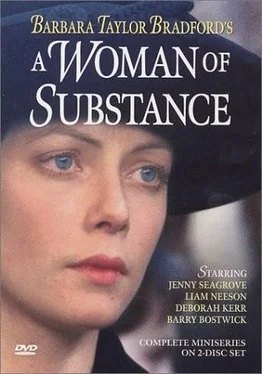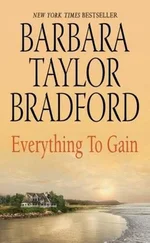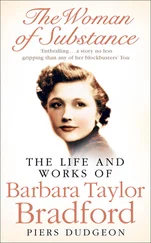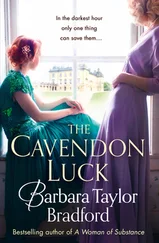Joe stared at her incredulously. ‘Oh, come on! That’s a bit far-fetched. Do you think I fell off a banana boat? I’m not green, you know.’
Emma decided these comments were unworthy of a reply. Instead she stretched out her hand. ‘I have been so rude, Mr Lowther. I haven’t introduced myself. My name is Emma Harte.’
He took her hand tentatively. He felt its dry coolness through the crocheted glove and her grip was firm, strong like a man’s. ‘Pleased to meet you, Miss Harte,’ he said.
‘It’s Mrs Harte,’ said Emma.
‘Oh, excuse me,’ said Joe, assailed by unexpected disappointment.
Emma grabbed the moment to drive her point home. ‘I don’t know what the rent is, Mr Lowther, but I would be prepared to pay you several months in advance.’ She must make the offer so tempting he would not be able to refuse. ‘Shall we say six months in advance? Surely that shows you my good faith and also my belief in myself.’
Joe was floundering, his resolve crumbling under the force of her compelling and winning personality. He recognized he was drawn to her. Dangerously attracted to her. The unworldly Joe was horrified. A married woman! Then it came to him in a rush. That was the real reason he did not want her as a tenant. He was afraid of falling under her spell.
Emma knew she was holding all the cards and she made her final move. She leaned forward and touched his arm gently. Joe jumped as if bitten by a snake. ‘Look here, Mr Lowther,’ Emma said firmly. ‘I have another idea. Apart from paying you the rent in advance, I’m also prepared to give you a letter of agreement stating that should my business fail I will not vacate the premises until you find another tenant. In other words, I will guarantee to give you sufficient warning before leaving. Shall we say three months’ notice?’ she suggested in a guileless voice.
Joe found it impossible to argue with this girl. Not only were her terms sound, they were all in his favour. He would look like an imbecile if he refused such an offer. ‘Well,’ he said at last, ‘you are certainly confident of your success in the shop, Mrs Harte. Otherwise you wouldn’t suggest such an arrangement. But it’s fair enough, I suppose. Don’t you want to look over the shop first, before going into this venture?’
‘I know the shop, Mr Lowther,’ Emma said with an airy wave of her hand. ‘I went into it several times. Your previous tenant was badly organized, the stock was shoddy and far too expensive for its quality, and she was obviously not a very clever buyer. Not only that, she didn’t know her customers!’
‘Oh,’ said Joe, dumbfounded.
‘I presume it’s settled, Mr Lowther,’ said Emma briskly.
‘Er, yes, of course. I’ll rent the shop to you,’ he said. ‘For a guinea a week. That makes it four guineas a month. There are living quarters attached to the shop. A large kitchen-parlour, a bedroom, and a huge cellar for storage. You could live there, behind the shop, and very comfortably, if you had a mind to.’
Emma nodded. ‘Yes, I probably will live there. It makes sense. Now, four guineas a month is around forty-eight guineas a year, give or take a few shillings, isn’t it?’ She began to peel off the notes, doing some fast mental arithmetic. ‘Could I have a receipt, please?’ she asked politely, handing over the cash.
‘Naturally,’ said Joe. ‘And I will get you the key and the rent book. I’ll mark the book paid for six months. Should it be in your name or your husband’s?’
‘Mine, please. My husband is in the navy, Mr Lowther. In foreign parts.’
‘Is he really!’ said Joe.
Emma nodded and went on, ‘I’ll write you the letter of agreement about the three months’ notice. I’ll bring it around tomorrow evening. Is that convenient? You can show it to your solicitor, if you want.’
‘No. No. That’s not necessary. And tomorrow night is perfectly convenient,’ said Joe. He stood up. ‘I’ll go and get the key and the rent book. I’ll be back in a jiffy.’
‘Aren’t you going to count the money?’ Emma asked, nodding at the pounds in his hand.
‘I trust you,’ Joe said. ‘Please excuse me, Mrs Harte.’
Emma heard him whistling as he went through into the kitchen. A wide smile of self-congratulation mingled with exultation flew on to her face. She could hardly contain herself.
She now had her first shop.
Joe Lowther shrugged into his black overcoat and dug his hands into his pockets, shivering as he strode along at a brisk pace. A fierce wind was whistling down the lane and it blew the sleet and snow against his body in swirling flurries. He was drenched again, as he had been every night this week. December had ushered in the foulest weather, which now at the end of the first week appeared to have settled in for a long siege. He was later than ever tonight. Once again he had been inveigled into staying at the foundry to finish the books as a special favour to Mr Ramsbotham, who had lately acquired the annoying habit of piling extra work on him. His tardiness irritated him for another, more significant reason. Usually on Friday evening, after his supper, he went to Emma Harte’s to look over the books for her. Tonight he would not be able to get there until almost ten o’clock, and Joe, the product of a lower-middle-class upbringing, was rigid in his observance of the proprieties. It did not seem correct to go calling on a young woman who lived alone at such a late hour. Still, he had promised and he felt honour-bound to keep his word.
Joe had taught Emma bookkeeping, and supervising her ledgers was a practice he considered unnecessary these days. Nevertheless, it was one he did willingly and, if he was honest with himself, he looked forward to doing it. Emma had a staggering aptitude for figures and kept meticulous books. It had struck him recently that she actually enjoyed toiling over those endless columns of figures in a way he did not. If the truth be known, he did not like bookkeeping at all. It was hardly his vocation. However, he had been apprenticed in the accounting office at the foundry when he was fifteen, and after nine years it had become a way of life for him. It never occurred to Joe to seek a more congenial employer. He was too set in his ways and, since he was not ambitious and lacked the drive to strike out in new directions, he remained shackled to Ramsbotham’s dreary books. Nor did it ever occur to the stolid Joe that he did not have to work at all, if he chose not to. He detested idleness and, more importantly, he harboured a palpable fear of boredom. His job at the foundry filled his days and helped to counteract the empty evenings of solitude that yawned inexorably before him month after month, year after year.
But Joe Lowther could have stopped working when his mother had died four years ago. It was then that Frederick Ainsley, the family solicitor, had sent for him to hear the will read and Joe had discovered, to his profound astonishment, that his mother had left him not only in comfortable circumstances but extremely well off. ‘It is An Inheritance, my boy,’ Mr Ainsley had said, speaking in capitals as befitted the occasion and the size of the estate. ‘A tribute to your poor departed mother’s prodigious and most commendable efforts over the years, and to your grandmother’s before her,’ the solicitor had intoned. Frederick Ainsley had then gone on to enumerate the number of properties Joe now owned, thanks to the unflagging industriousness of those two women on the maternal side of the family. The Inheritance, which Joe immediately felt obliged to think of in Mr Ainsley’s large letters, included eight shops in Town Street, a row of cottages in Armley, several terrace houses in nearby Wortley, and, to Joe’s further incredulity, two large plots of land near St Paul’s Street in Leeds itself. ‘Better hang on to those, Joe,’ Ainsley had instructed. ‘They will increase in value. Lots of building going on in Leeds. When you do sell it should be for a high price.’ Finally, the speechless Joe had learned that his mother had left him fifty-five thousand pounds in cash in the Midland Bank. Joe had staggered out of the solicitor’s office reeling from shock on that awesome day. Later, sitting on the tram on his way home to Armley, a cold anger had settled over him. His mother had never ceased her querulous warnings of financial disaster looming on the horizon. His sweet-tempered and henpecked father had been mercilessly driven into an early grave from overwork and lack of nourishing food and proper medical attention. Why had his mother been so cruel when they had had so much? he had asked himself, and his resentment of her had not lessened with time.
Читать дальше
Конец ознакомительного отрывка
Купить книгу












